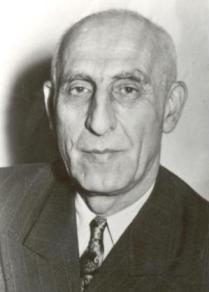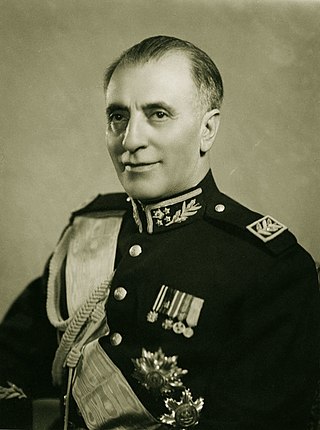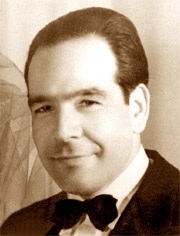
The history of Armenia covers the topics related to the history of the Republic of Armenia, as well as the Armenian people, the Armenian language, and the regions of Eurasia historically and geographically considered Armenian.

Mohammad Mosaddegh was an Iranian politician, author, and lawyer who served as the 35th Prime Minister of Iran from 1951 to 1953, after appointment by the 16th Majlis. He was a member of the Iranian parliament from 1923, and served through a contentious 1952 election into the 17th Iranian Majlis, until his government was overthrown in the 1953 Iranian coup d'état aided by the intelligence agencies of the United Kingdom (MI6) and the United States (CIA), led by Kermit Roosevelt Jr. His National Front was suppressed from the 1954 election.

The 1953 Iranian coup d'état, known in Iran as the 28 Mordad coup d'état, was the U.S.- and British-instigated, Iranian army-led overthrow of the democratically elected Prime Minister Mohammad Mosaddegh in favor of strengthening the monarchical rule of the shah, Mohammad Reza Pahlavi, on 19 August 1953. It was aided by the United States and the United Kingdom. The clergy also played a considerable role.

The Anglo-Persian Oil Company (APOC) was a British company founded in 1909 following the discovery of a large oil field in Masjed Soleiman, Persia (Iran). The British government purchased 51% of the company in 1914, gaining a controlling number of shares, effectively nationalizing the company. It was the first company to extract petroleum from Iran. In 1935 APOC was renamed the "Anglo-Iranian Oil Company" (AIOC) when Reza Shah formally asked foreign countries to refer to Persia by its endonym Iran.

Fazlollah Zahedi was an Iranian lieutenant general and statesman who replaced the Iranian Prime Minister Mohammad Mosaddegh through a coup d'état supported by the United States and the United Kingdom.
Donald Newton Wilber, American writer and spy.

Varto is a town in Muş Province, Turkey. It is the seat of Varto District. Its population is 10,914 (2022).

Ali Razmara, also known as Haj Ali Razmara, was a military leader and prime minister of Iran.

Hossein Fatemi was an Iranian scholar. A close associate of Prime Minister Mohammad Mosaddegh, he proposed nationalization of Iranian oil and gas assets. Initially a journalist, he served as minister of foreign affairs from 1951 to 1953. After the 1953 coup d'état toppled the government of Mosaddegh, Fatemi was arrested, tortured, and convicted by a military court of "treason against the Shah", and executed by a firing squad.

Peter Balakian is an Armenian-American poet, prose writer, and scholar. He is the author of many books including the 2016 Pulitzer prize winning book of poems Ozone Journal, the memoir Black Dog of Fate, winner of the PEN/Albrand award in 1998 and The Burning Tigris: The Armenian Genocide and America's Response, winner of the 2005 Raphael Lemkin Prize and a New York Times best seller. Both prose books were New York Times Notable Books. Since 1980 he has taught at Colgate University where he is the Donald M and Constance H Rebar Professor of the Humanities in the department of English and Director of Creative Writing.

The Persian campaign or invasion of Iran was a series of military conflicts between the Ottoman Empire, British Empire and Russian Empire in various areas of what was then neutral Qajar Iran, beginning in December 1914 and ending with the Armistice of Mudros on 30 October 1918, as part of Middle Eastern theatre of World War I. The fighting also involved local Persian units, who fought against the Entente and Ottoman forces in Iran. The conflict proved to be a devastating experience for Persia. Over 2 million Persian civilians died in the conflict, mostly due to the Armenian genocide by the Ottoman regime and Persian famine of 1917–1919, influenced by British and Russian actions. The Qajar government's inability to maintain the country's sovereignty during and immediately after the First World War led to a coup d'état in 1921 and Reza Shah's establishment of the Pahlavi dynasty.
Karapetê Xaço or Karabêtê Xaço or Gerabêtê Xaço, was an Armenian singer of traditional Kurdish Dengbêj music.

Pahlavi Iran, officially the Imperial State of Persia until 1935 and the Imperial State of Iran thereafter, was the Iranian state between 1925 and 1979, under the rule of the Pahlavi dynasty.
The United States is widely considered to have one of the most extensive and sophisticated intelligence network of any nation in the world, with organizations including the Central Intelligence Agency and the National Security Agency, amongst others. It has conducted numerous espionage operations against foreign countries, including both allies and rivals. Its operations have included the use of industrial espionage, cyber espionage. and mass surveillance.

Khetcho was a renowned Armenian activist and combatant. A member of the Armenian Revolutionary Federation, Khetcho led an active life in Armenian politic affairs. During his time as an activist, he participated in the Khanasor Expedition, an offensive by Armenian fedayees against the Kurdish Mazrik tribe on July 25, 1897. He was also a key supporter of the Iranian Constitutional Revolution. In 1915, during a skirmish between Turkish forces near Bitlis, he was killed in action.

The nationalization of the Iranian oil industry resulted from a movement in the Iranian parliament (Majlis) to seize control of Iran's oil industry, which had been run by private companies, largely controlled by foreign interests. The legislation was passed on March 15, 1951, and was verified by the Majlis on March 17, 1951. The legislation led to the nationalization of the Anglo-Iranian Oil Company (AIOC). The movement was led by Mohammad Mosaddegh, a member of the Majlis for the National Front and future prime minister of Iran. The movement to nationalize the oil industry was the reaction to the following concessions made by Iran to foreign powers: the Reuter concession of 1872, proceeding letter,D'Arcy Concession?] the 1933 agreement between the Iranian government and AIOC, and the Gas-golshaian[?] contract. According to the political scientist Mark J. Gasiorowski, the oil nationalization movement had two major results: the establishment of a democratic government and the pursuit of Iranian national sovereignty.

Talaat Pasha: Father of Modern Turkey, Architect of Genocide is a 2018 academic book by Hans-Lukas Kieser, published by Princeton University Press. It is a biography of Talaat Pasha. As of 2018 there had been no recent biographies of Talaat, nor of Enver Pasha, in western European languages. The book discusses the author's thesis that Talaat was co-Father of the Nation to modern Turkey along with Mustafa Kemal Atatürk, as well as Talaat's rule and significance.

Killing Orders: Talat Pasha's Telegrams and the Armenian Genocide is a 2016 book from Taner Akcam about the veracity of the primary source evidence of the Armenian genocide, particularly telegrams sent by Talaat Pasha. He addresses dismissal of the authenticity of evidence as a form of Armenian genocide denial. The original Turkish version was published in Istanbul by İletişim yayınları. The English version, published by Palgrave Macmillan, came in 2018.
Mehmet Şerif Fırat was a Kurdish author and is known for his 1945 book History of Varto and the Eastern Provinces in which he denied the existence of Kurds and claimed they are of Turkish origin. The book was republished in 1961 and counted with a foreword from the Turkish president Cemal Gürsel.














